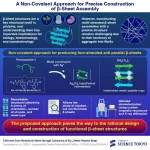(Press-News.org) IMPERIAL COLLEGE LONDON PRESS RELEASE
Under STRICT EMBARGO until:
10 December 2024
10:00 UK TIME / 05:00 ET
Peer-reviewed / Observational study / People
Trial shows no significant difference in performance between visually impaired participants using new device and sighted participants using only natural vision.
Participants performed significantly better using new device than with currently available vibration technology.
The new device is believed to be the most advanced navigation tech of its kind for people with visual impairment.
A groundbreaking piece of navigation technology that uses the ability to sense information through touch can help people with visual impairment perform a location task as well as sighted people, according to new Imperial-led research.
Researchers from Imperial College London, working with the company MakeSense Technology and the charity Bravo Victor, have developed a shape-changing device called Shape that helps people with visual impairment navigate through haptic perception – the way people understand information about objects through touch. The device, which looks like a torch, bends to indicate where a person needs to move and straightens when the user is facing the correct direction.
In a study published in Nature Scientific Reports, researchers tested how well people with visual impairment were able to locate targets in a 3D virtual reality (VR) space using Shape and vibration feedback technology – which is commonly used to help visually impaired people navigate. Sighted individuals were also recruited for the study to locate the targets in the VR space using only their natural vision.
Dr Ad Spiers, lead researcher for the study, from Imperial’s Department of Electrical and Electronic Engineering, said: “The exciting thing about this study is we’ve managed to demonstrate that Shape can help people with visual impairment perform a navigation task as well as sighted people. This is something that we haven’t seen before with other navigation devices.
“Shape is unusual because it uses our ability to understand information through touch in a way that goes beyond vibration. Humans have an innate ability to feel and interpret shapes through our hands, with very little concentration. Exploiting this allows us to create a device that is simple to learn and isn’t tiring to use.”
The study compared the results of 10 participants with visual impairment and 10 sighted participants, testing their ability to locate targets as quickly as possible in a controlled indoor environment, measuring the time taken to locate virtual targets and the efficiency in locating these targets.
The trial found that there was no significant difference in the performance between visually impaired participants using Shape and sighted participants using only natural vision. It also found that participants with visual impairment located targets significantly faster using Shape than with vibration technology. Feedback showed that participants with visual impairment preferred using Shape to vibration technology.
It is hoped that the device, which is believed to be the most advanced of its kind, could be the future of navigation technology for visual impairment, as the Shape device has notable advantages over current tools used to guide people with visual impairment.
Dr Robert Quinn, CEO of MakeSense Technology, said: “The impressive results from this study demonstrate the enormous potential of this technology to make life changing improvements in mobility for people with visual impairment.
“Building upon the research described in this paper, MakeSense is developing a blind wayfinding product which leverages the latest advancements in spatial artificial intelligence and computer vision without the need for interpretive training. We are aiming for our first product to be available from the end of 2025.”
Currently, individuals with visual impairment most commonly use aids such as white canes or guide dogs. While guide dogs are often effective, they require expensive expert training and can cost thousands of pounds per year to keep. White canes enable navigation through a process of elimination by telling users where not to go, rather than where they should go. This process limits a user's ability to navigate freely in complex environments.
Recent developments with technology have tended to focus on using auditory interfaces, which give audio cues such as “turn left at the next corner”, or vibration feedback, which alerts a user through vibration patterns that indicate where to move.
Auditory interfaces can prevent people from hearing important warning sounds of imminent hazards and can dampen users’ ability to engage fully with the world. Vibration feedback can lead to numbness after prolonged periods of use and studies have shown users can become quickly irritated and distracted by frequent vibration sensations.
In order to test the performance of Shape against vibration technology and natural sight in a controlled environment, the researchers designed a simulation of real-world navigation that reduced the possibility of significant variation between experiments.
In a real-world navigation scenario, it is expected that there would be significant variation in conditions due to changes in weather and the presence of other pedestrians or objects. It is also expected that there will often be multiple potential target options in a real-world scenario rather than the single targets which were presented individually in the experiment.
Further research is needed to understand how the Shape device performs in more variable real-world scenarios.
The Shape device was developed working with MakeSense Technology, a startup company which was co-founded at Imperial by Dr Robert Quinn - an Imperial PhD graduate in Mechanical Engineering. The company received support in its early stages from Imperial’s thriving entrepreneurial ecosystem, which aims to develop innovative solutions with the potential to change the world for better.
Following the completion of the Shape study, MakeSense has worked on developing the technology further to be used for real-world outdoor navigation. It is hoped that the device could be ready for practical use in real-world environments in the coming years.
The research published in Nature Scientific Reports was supported by funding from Innovate UK’s SMART Grant, which was awarded to MakeSense Technology Ltd, Bravo Victor, and Imperial College London.
'A shape-changing haptic navigation interface for vision impairment' by Adam J. Spiers et al. is published in Nature Scientific Reports.
NOTES TO EDITOR:
The full paper in Nature Scientific Reports can be found here: https://www.dropbox.com/scl/fi/fzb4dnkpd22dy0vfldg5v/41598_2024_79845_OnlinePDF_Patched.pdf?rlkey=iyer3bq8yxncfu6a7sq4gbknp&st=8qcddh1g&dl=0
Images of the Shape device can be found here: https://www.dropbox.com/scl/fo/mdvvzi9xhf9uq7iag3dld/AL6k5r9Z6NA5ElPj8w1Qj3k?rlkey=kkydmc4ms6yznioieyxblq44x&e=2&dl=0
A video demonstration of the Shape device’s movements can be found here: https://www.dropbox.com/scl/fi/m1iqbh2gsgubg8ttcrp2w/Supplementary-Video-Device-Movement.mp4?rlkey=0kqoyquujb3vgx4rlyp5h2g5t&e=1&dl=0
Images and video should be credited to ‘Dr Ad Spiers/Imperial College London’.
Entrepreneurial staff and students at Imperial can receive support from the university’s Enterprise Division to guide them through the process of developing their ideas into successful businesses. Previous startups that have come through Imperial include seaweed-based packaging manufacturers Notpla, energy technology company Ceres Power, and quantum computing company PsiQuantum.
For more information, please contact:
Conrad Duncan (he/him)
Media Officer
Imperial College London
Tel: +44 (0)20 7594 6860
Email: c.duncan@imperial.ac.uk
Out-of-hours duty media officer: +44 (0)7803 886 248
This press release uses a labelling system developed by the Academy of Medical Sciences to improve the communication of evidence. For more information, please see: http://www.sciencemediacentre.org/wp-content/uploads/2018/01/AMS-press-release-labelling-system-GUIDANCE.pdf
About Imperial College London
We are Imperial – a world-leading university for science, technology, engineering, medicine and business (STEMB), where scientific imagination leads to world-changing impact.
As a global top ten university in London, we use science to try to understand more of the universe and improve the lives of more people in it. Across our nine campuses and throughout our Imperial Global network, our 22,000 students, 8,000 staff, and partners work together on scientific discovery, innovation and entrepreneurship. Their work navigates some of the world’s toughest challenges in global health, climate change, AI, business leadership and more.
Founded in 1907, Imperial’s future builds on a distinguished past, having pioneered penicillin, holography and fibre optics. Today, Imperial combines exceptional teaching, world-class facilities and a habit of interdisciplinary practice to unlock scientific imagination.
https://www.imperial.ac.uk/
END
Shape-changing device helps visually impaired people perform location task as well as sighted people - EMBARGO: Tuesday 10 December (10:00 UK time)
2024-12-10
ELSE PRESS RELEASES FROM THIS DATE:
AI predicts that most of the world will see temperatures rise to 3°C much faster than previously expected
2024-12-10
Three leading climate scientists have combined insights from 10 global climate models and, with the help of artificial intelligence (AI), conclude that regional warming thresholds are likely to be reached faster than previously estimated.
The study, published in Environmental Research Letters by IOP Publishing, projects that most land regions as defined by the Intergovernmental Panel on Climate Change (IPCC) will likely surpass the critical 1.5°C threshold by 2040 or earlier. Similarly, several regions are on track to exceed the 3.0°C threshold ...
Second round of FRONTIERS Science Journalism Residency Program awards grants to ten journalists
2024-12-10
The FRONTIERS Science Journalism in Residency Programme has selected ten science journalists to participate in its second round of residencies. The chosen candidates—Marta Abbà, Rina Caballar, Danielle Fleming, Will Grimond, Giorgia Guglielmi, Suvi Jaakkola, Tim Kalvelage, Thomas Reintjes, Senne Starckx, and Meera Subramanian—will spend three to five months in residency at European research institutions, working on their journalistic projects.
The residencies, hosted by institutions in Austria, Denmark, Germany, Italy, the Netherlands, Norway, Spain and the United Kingdom, offer a unique opportunity ...
The inequity of wildfire rescue resources in California
2024-12-10
AUSTIN, TX, December 10, 2024 – Wildfires in California are intensifying due to warmer temperatures and dry vegetation – putting more residents at risk of experiencing costly damages or losing their homes. Marginalized populations (lower income, elderly, and the disabled) often suffer the most and, according to a new study, may receive less economic and emergency assistance compared to wealthy residents.
A detailed analysis of more than 500 California wildfire incidents from 2015 to 2022 by University at Buffalo scientists shows that disaster recovery resources in California favor people living in wealthy communities over disadvantaged ...
Aerosol pollutants from cooking may last longer in the atmosphere – new study
2024-12-10
New insights into the behaviour of aerosols from cooking emissions and sea spray reveal that particles may take up more water than previously thought, potentially changing how long the particles remain in the atmosphere.
Research led by the University of Birmingham found pollutants that form nanostructures could absorb substantially more water than simple models have previously suggested. Taking on water means the droplets become heavier and will eventually be removed from the atmosphere when they fall as rain.
The team, also involving researchers ...
Breakthrough in the precision engineering of four-stranded β-sheets
2024-12-10
A newly developed approach can precisely produce four-stranded β-sheets through metal–peptide coordination, report researchers from Institute of Science Tokyo. Their innovative methodology overcomes long-standing challenges in controlled β-sheet formation, including fibril aggregation and uncontrolled isomeric variation in the final product. This breakthrough could advance the study and application of β-sheets in biotechnology and nanotechnology.
In addition to the natural sequence of amino acids that makes up a protein, their three-dimensional arrangement in space is also critical to their function. For ...
Family income predicts adult problems more than neighborhood poverty
2024-12-10
A new paper in the Journal of Public Health, published by Oxford University Press, finds that household income in early childhood is a stronger and more consistent predictor for several major health-related problems for 17-year-olds than growing up in a poor neighborhood. The neighborhood was a slightly stronger predictor for obesity only.
The Index of Multiple Deprivation, which assesses neighborhoods in the United Kingdom according to factors including unemployment, low levels of education, crime, and barriers ...
Leading stress expert Ron de Kloet on hormone's dual nature: From protection to harm
2024-12-10
LEIDEN, Netherlands, 10 December 2024 – In a wide-ranging Genomic Press Interview, eminent neuroscientist Dr. Edo Ronald (Ron) de Kloet reveals crucial insights into how stress hormones can shift from protecting to potentially damaging the brain, a discovery that has transformed our understanding of stress-related mental disorders and opened new therapeutic pathways.
Dr. de Kloet, Professor Emeritus at Leiden University Medical Centre and an Academy Professor of the Royal Netherlands Academy ...
Almost half of young vapers are able to stop with quitline help
2024-12-10
Quitline coaching over the phone helped almost half of young people who vape ditch the habit, potentially improving their health and decreasing the chances they’ll transition to cigarettes, according to a new study.
The finding is promising and provides critical evidence about vaping cessation, an area with limited research to date, said Liz Klein, a researcher at The Ohio State University College of Public Health and co-author of the study, which appears in the American Journal of Preventive Medicine today (Dec. 10, 2024).
“This study provides hope that young adult ...
After a divisive election, most U.S. adults ready to avoid politics this holiday
2024-12-10
A majority of U.S. adults hope to avoid political discussions during the holidays and, in some cases, family members they disagree with, according to a survey by the American Psychological Association.
More than 7 in 10 adults (72%) said they hope to avoid discussing politics with family over the holidays. And while 65% of adults said they were not worried that political discussions would hurt their relationships with their family members during the holidays, nearly 2 in 5 adults (39%) said they were stressed ...
Food insecurity in LA County remains well above national average, despite slight decline
2024-12-10
Despite a modest 5% improvement since 2023, food insecurity in L.A. County remains alarmingly high — well above the national average and L.A.’s pre-pandemic level. A USC Dornsife College of Letters, Arts and Sciences study found that as of October 2024, 25% of L.A. County households — about 832,000 — struggle with food insecurity. By comparison, the national average is just 14%. Among low-income households in L.A. County, 41% experienced food insecurity in 2024, compared to 27% pre-pandemic.
“The ...


